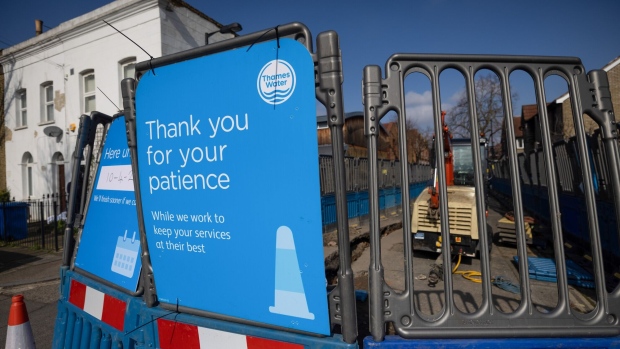Mar 28, 2024
Thames Water Won’t Get £500 Million From Shareholders This Month
, Bloomberg News

(Bloomberg) -- The owners of Thames Water Utilities Ltd. are heading for a showdown with the government after shareholders refused to inject £500 million ($631 million) into the troubled supplier.
The decision, announced Thursday, leaves a yawning hole in the finances of the UK’s largest water and sewage company, which could prompt the government to start special administration proceedings, a form of temporary nationalization. Ministers want to see shareholders come forward but investors want better returns before they’re prepared to put money into the company.
The news puts a potentially toxic consumer issue on Prime Minister Rishi Sunak’s plate five weeks out from local elections, including for Mayor of London, where Thames operates. The main opposition Labour Party has long blamed privatization drives under former Conservative Prime Minister Margaret Thatcher for raising the risk of such scenarios, an argument they will be sure to reprise in the elections.
Shareholders at parent company Kemble Water Holdings Ltd. last year promised to pump £750 million into Thames by March 2025, with £500 million promised by the end of this month pending regulatory approval of its investment plan, which stretches out to 2030. The company needs £2.5 billion to fund its £18.7 billion business plan.
Thames is the worst performer among England and Wales’s water and sewage companies and desperately needs the cash to improve pipes so it can meet government targets on leaks, pollution and customer service.
How Debt and Sewage Pushed Thames Water to the Brink: QuickTake
Thames has proposed to raise customer bills by a hefty 40% starting in 2025, and has asked Ofwat for leeway on rules around the weighted cost of capital, dividend payouts and the allowed return on equity for investors. However, Ofwat said it couldn’t give any flexibility to Thames because of its past and current poor financial and environmental performance, according to a person familiar with the discussions who asked not to be identified because the matter is private.
“After more than a year of negotiations with the regulator, Ofwat has not been prepared to provide the necessary regulatory support for a business plan which ultimately addresses the issues that Thames Water faces,” the shareholders said in a joint statement. “As a result, shareholders are not in a position to provide further funding.”
Thames chief executive Chris Weston, who took on the role in January, denied that the company is trying to force the regulator to permit more financial flexibility. The company is following the rules set out by the regulatory process, known as Price Review 24, he said on a call with journalists.
The signs of stress are starting to show already. Kemble said the lack of funding means it will now be unable to pay to refinance or repay a £190 million loan which matures on 30 April unless an extension to the maturity of the facility is granted by lenders.
This could potentially push Kemble into administration and leave Thames without an owner. At that point the government may consider triggering a special administration to protect customers.
The government has been drawing up plans to potentially bring Thames into special administration, streamlining its insolvency rules for the industry. Debt holders are concerned that they’d be left with losses if the troubled company goes bankrupt. A spokesman for the Department for Environment, Food and Rural Affairs said it is preparing for a range of scenarios.
Weston said special administration was a possibility, but that Thames would pursue other options first.
“If at the end of the day, probably well into the end of next year, we were in a situation where we had no equity, then there is the prospect of special administration but we are a long way from that point at the moment,” he said on BBC radio.
On a call with journalists, he said Thames would now work to amend its business plan ahead of Ofwat’s draft decision in mid June. Once that decision is published, Thames would try again to convince existing shareholders to provide new equity, or failing that, would “go to the market” to seek new equity.
He added that Thames has £2.4 billion in cash, which would allow it to continue operations for the next 15 months. During that time it would also seek to raise more debt.
“Safeguards are in place to ensure that services to customers are protected,” an Ofwat spokesperson said. “Today’s update from Thames Water means the company must now pursue all options to seek further equity for the business.”
Thames Water’s owners have been criticized for its complex structure, whereby many of the company’s operating assets sit within one entity, while it has issued debt through a number of others, such as Kemble Finance.
Thames Water Kemble bonds this month dropped below 30 pence on the pound, well into distressed territory, according to prices compiled by Bloomberg.
--With assistance from Ellen Milligan, Abhinav Ramnarayan and Ronan Martin.
(Updates with details from fourth paragraph.)
©2024 Bloomberg L.P.







